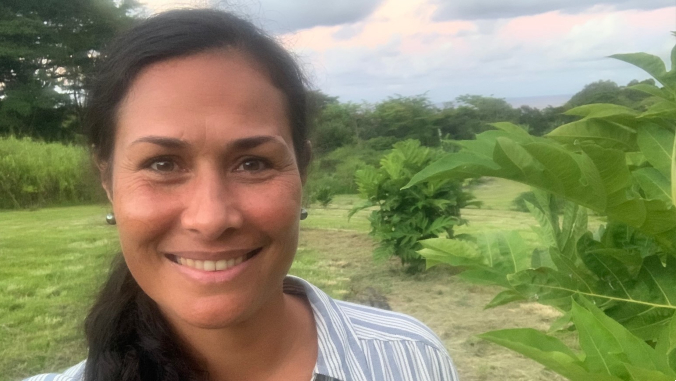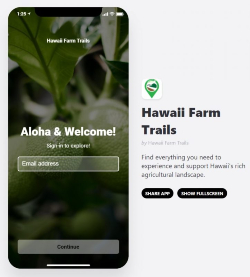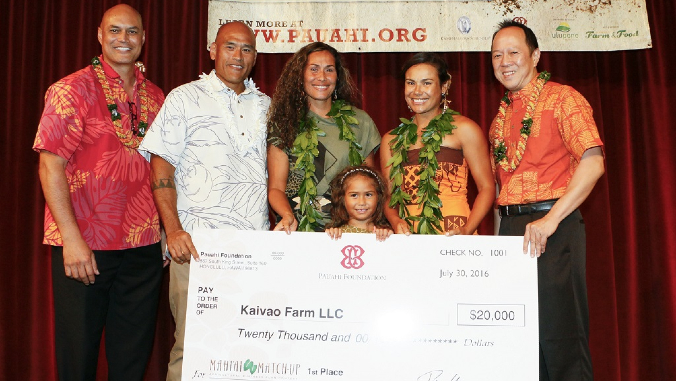
Now is an opportune time for tourism students to learn about the industry that has been largely shut down throughout Hawaiʻi due to the global pandemic, according to a University of Hawaiʻi at Hilo assistant professor.
Angela Faʻanunu is no stranger to teaching innovative strategies to her classes on sustainable tourism and business. Faʻanunu sees the disruption caused by COVID-19 as a potential time of reflection that will hopefully lead to more thorough planning strategies for Hawaiʻi’s economic and cultural future. Her collaborations with various federal, state and private agencies aim to increase agritourism on Hawaiʻi Island, an approach she believes will create more resilient and economically stable Pacific communities.
Envisioning a sustainable tourist industry
In her courses, Faʻanunu challenges students to reimagine the conventional mass tourism industry in favor of alternative, more regenerative models centered around agritourism and indigenous tourism, based on relationships of reciprocity between hosts and visitors.
“COVID has created an awareness that perhaps the model we have for tourism isn’t the best one for our small islands. Perhaps we need to find other ways of engaging with the visitor industry that build the resilience of our local communities, such as our local farmers,” she said. “To me, agritourism is a win-win situation but to develop this industry in Hawaiʻi, we need to plan carefully. Allowing commercial activity on agricultural lands can be tricky so we need to ensure that they are protected and that we maintain the integrity and sense of place of our local communities while also enabling small farmers to succeed by being financially sustainable.”
Practicing Pacific resilience

Faʻanunu offers integral expertise on agritourism as co-founder of Kaivao Farm in Pāhoehoe, just north of Hilo, which she said has a vision to cultivate Pacific resilience.
In 2016, Kaivao Farm won $20,000 in seed money as a first-place winner of the 2016 Mahiʻai Match-Up Agricultural Business Plan Contest sponsored by Kamehameha Schools and the Pauahi Foundation. The farm, independently owned and operated by Faʻanunu and her sister, Kalisi Mausio, subsequently received a grant from the U.S. Department of Agriculture to develop the capacity of agritourism for Hawaiʻi county. This led to the development of the Hawaiʻi Farm Trails mobile app, an electronic platform that connects visitors and residents to agricultural activities such as farm tours, farmer’s markets, agricultural festivals and events. “We really learned how important tourism is for small farms,” said Faʻanunu.
Cultivating new strategies during the pandemic
Previously, before the pandemic caused a total shift to online teaching, Faʻanunu took her classes to visit local farms. Now curbed from farm visits during the COVID-19 era, she is turning toward international conferences and the potential to host overseas guest speakers.
“Students can attend talks and conferences across the world,” she said.
Faʻanunu’s seamless integration of regional and global lenses gives her students the well-rounded perspective she hopes will be adopted by current and future generations to plan for better preparedness in the future.
“You can plan to plan or you can plan to act,” she said, noting that her goal is to inspire students with strategies that communities across the world are implementing to address shortcomings laid bare by the pandemic’s repercussions. “Tourism is just one of these strategies, but tourism has become such a prevalent strategy that it has overpowered everything else. COVID has shown us that perhaps we need to figure out those other strategies to make us more resilient.”
Read the full story at UH Hilo Stories.
—By Emily Burkhart, a UH Hilo English and Gender and Women’s Studies student


